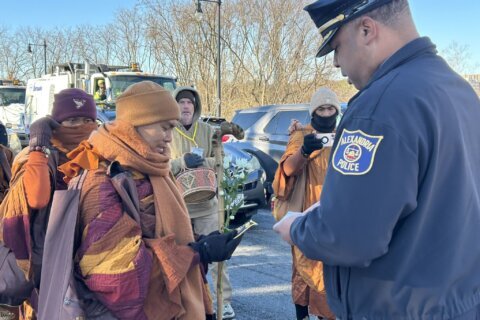Within hours of the news the U.S. Supreme Court struck down the ability of colleges and universities to weigh race as a factor in admissions, elected officials and school leaders across the D.C. region were weighing in on the ruling’s impact.
In a statement, Virginia Gov. Glenn Youngkin praised the court’s decision, saying the country is “closer than ever before to ensuring that an individual’s future opportunities are unlocked based on the trajectory of their potential, their aspirations, and the quality of their capabilities as opposed to simply on their race.”
Maryland Gov. Wes Moore called the decision a “misguided ruling,” and said it would not weaken the state’s commitment to “building an inclusive education system that prepares our students for jobs of the future.”
Maryland House Speaker Del. Adrienne Jones said she was consulting with Anthony Brown, Maryland’s Attorney General, on ways to “mitigate” the effects of what she called a “disheartening blow” to the country’s efforts to address the impacts of a history that includes slavery, Jim Crow and segregation.
In her statement on the court’s decision, Del. Jheanelle Wilkins, chair of the Legislative Black Caucus of Maryland, referenced past efforts of lawmakers to advocate for a $577 million settlement awarded to the state’s HBCUs to address inequities in funding for those institutions.
Wilkins said “it really shows that even present-day,” there are struggles to make certain there is equal access to higher education in Maryland.
School officials weigh in
DC
At Howard University, school officials called the decision “deeply concerning.”
“The decision will not only have a devastating impact on the diversity of colleges and universities across the country, but will also decrease access to higher education for students of color everywhere,” the university said in a statement.
In a letter to the campus community, George Washington University President Mark Wrighton and President-elect Ellen Granberg said the ruling “will likely affect how we enroll diverse and talented undergraduate and graduate students who make our vibrant community what it is today.
“For decades, race-conscious admissions have played a pivotal role in advancing our institution’s mission, enriching the educational experience of our students, and cultivating a vibrant tapestry of diversity that supports learning and personal growth,” they said.
Georgetown University said it will gather academic and admissions leaders to evaluate the impact of the ruling on the university’s programs.
“Affirmative action was built on hope — the hope that we could be better in the future than we’ve been in the past. Georgetown embraced this hope. Now, we will need to find new ways of restoring this hope,” President John DeGioia said in a message to the campus community.
Maryland
Jay Perman, Chancellor of the University System of Maryland, issued a statement saying that “diversity is a guiding principal” for the university system, which includes the University of Maryland at College Park, Bowie State University and Towson University, among others.
Perman said the mission statement of the schools within the system calls for reflecting the diversity of the state, and added, “our universities can and will do this within the bounds of federal law.”
Darryl Pines, President of the University of Maryland at College Park, said in a statement that “race has never been the determining factor here at the University of Maryland,” but called the decision by the high court “disappointing.”
“It’s impossible to dismantle centuries of racism without acknowledging and considering race in the decisions we make today,” Pines said in the statement.
In a letter to students at Johns Hopkins University, President Ron Daniels said “a diverse student body enriches the educational experience,” and that while the Supreme Court’s decision represents a “significant setback,” it does not seem to affect the school’s programs created to recruit students who are the first in their families to go to college, or who come from families with limited incomes.
Daniels said in 2010, Black students made up just 6% of the student body and Hispanics represented only 8% of students in the undergraduate program. Today, he said, Black students make up 16% of students attending at the undergraduate level, and 24% are Hispanic.
“It goes without saying that these students are among those with the strongest academic credentials in the country,” Daniels said.
Morgan State University, one of Maryland’s HBCUs, said the decision “may be viewed as a setback for diversity for many higher education institutions nationwide,” but that “Morgan does not use race, nor has it ever used race, as a factor when reviewing applications.”
The university said it does not “anticipate any negative impact” on its ability to serve a multiethnic and multiracial student body.
Virginia
The University of Virginia, in a message to the campus community, said it’s still evaluating the opinion to see how it may impact the school’s current admissions approach.
President James Ryan and Executive Vice President and Provost Ian Baucom said “diversity, in all its forms, is critical to the educational experience, because students learn not just from their professors but from each other.”
At an Academic and Student Life Committee meeting earlier this month, the university detailed an effort to boost recruitment at high schools where few students apply. The initiative will target 40 Virginia high schools.
Meanwhile, the court’s ruling won’t impact George Mason University, according to Paul Allvin, the school’s vice president and chief brand officer. The university’s admissions processes have been race neutral, he said, and are test-optional for undergraduate applicants.
“When a student applies to Mason, that student is evaluated on high school academic performance, extracurricular activities, community activities, the personal essay and personal story is very important to us,” Allvin said.
The university has a 90% admissions rate, he said.
“In terms of the community in general, I think there is a general hope that this does not negatively impact higher education in America,” Allvin said.
Arlington parent and trial lawyer Megan Whiteside said there are a lot of unknowns regarding the implications of the ruling.
The ruling, Whiteside said, “doesn’t stop kids from applying with essays that address the challenges that they faced. And really, college admissions may just focus on applications with essays that point to the factors that really were the basis for affirmative action in the first place. And that’s entirely appropriate under the analysis of the decision.”
Shauna Knox, senior vice president at the National Black Child Development Institute, said the ruling will result in “a less diverse student body, a less diverse workforce and a less diverse leadership in our country.”









